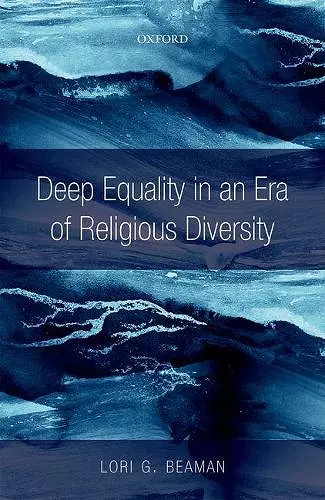Deep Equality in an Era of Religious Diversity
Format:Hardback
Publisher:Oxford University Press
Published:15th Jun '17
Currently unavailable, and unfortunately no date known when it will be back

While religious conflict receives plenty of attention, the everyday negotiation of religious diversity does not. Questions of how to accommodate religious minorities and of the limits of tolerance resonate in a variety of contexts and have become central preoccupations for many Western democracies. What might we see if we turned our attention to the positive narratives and success stories of the everyday working out of religious difference? Rather than 'tolerance' and 'accommodation', and through the stories of ordinary people, this book traces deep equality, which is found in the respect, humour, and friendship of seemingly mundane interactions. Deep Equality in an Era of Religious Diversity shows that the telling of such stories can create an alternative narrative to that of diversity as a problem to be solved. It explores the non-event, or micro-processes of interaction that constitute the foundation for deep equality and the conditions under which deep equality emerges, exists, and sometimes flourishes. Through a systematic search for and examination of such narratives, Lori G. Beaman demonstrates the possibility of uncovering, revealing, and recovering deep equality--a recovery that is vital to living in an increasingly diverse society. In achieving deep equality, identities are fluid, shifting in importance and structure as social interaction unfolds. Rigid identity imaginings, especially religious identities, block our vision to the complexities of social life and press us into corners that trap us in identities that we often ourselves do not recognize, want, or know how to escape. Although the focus of this study is deep equality and its existence and persistence in relation to religious difference, deep equality is located beyond the realm of religion. Beaman draws from the work of those whose primary focus is not in fact religion, and who are doing their own 'deep equality' work in other domains, illustrating especially why equality matters. By retelling and exploring stories of negotiation it is possible to reshape our social imaginary to better facilitate what works, which varies from place to place and time to time.
[Beaman's] approach to diversity is a refreshing one and certainly worthy of further exploration. * Jeffery D. Long, Elizabethtown College, The Journal of Religion *
[T]he book is a very useful corrective to prevailing theoretical and practical approaches vis-à-vis religious identity and diversity. The reader will find the ethnographic work particularly illuminating in grounding many of the abstract theories and concepts often employed in discussions involving religious freedom and in emphasizing that deep equality depends, by and large, on people recognizing similarities in one another. Deep Equality thus significantly broadens the frame with which we view these debates, not only in terms of methodology but also substance. There is a rich world outside law, notwithstanding law's seemingly long shadow. And it starts with the person in front of us. * Anna Su, JAAR *
This is a book that will inspire those teaching in the field of religious diversity, pointing researchers into new and fruitful directions. Highly recommended. * Nova Religio *
Deep Equality is a fresh and lively argument for a new way of thinking about how Western democracies negotiate relationships of inequality, moving us beyond ideas of tolerance and accommodation. The contributions are solidly grounded in Beaman's formidable readings in at least three different areas: the sociology of religion and related social science disciplines, philosophy, and legal studies. In this wonderfully interdisciplinary text Beaman brings theoretical tools from these disciplines to bear on important questions in innovative ways. * Mary Jo Neitz, Reading Religion *
Beaman's research leaves her optimistic that despite institutional challenges and the received view, we can move toward and experience alternative narratives of deep equality a true inclusivity of Others, who in everyday interaction become recognized and encountered as being more similar than different. This is an important recognition. * Michele Dillon, JSSR *
ISBN: 9780198803485
Dimensions: 240mm x 162mm x 20mm
Weight: 534g
244 pages